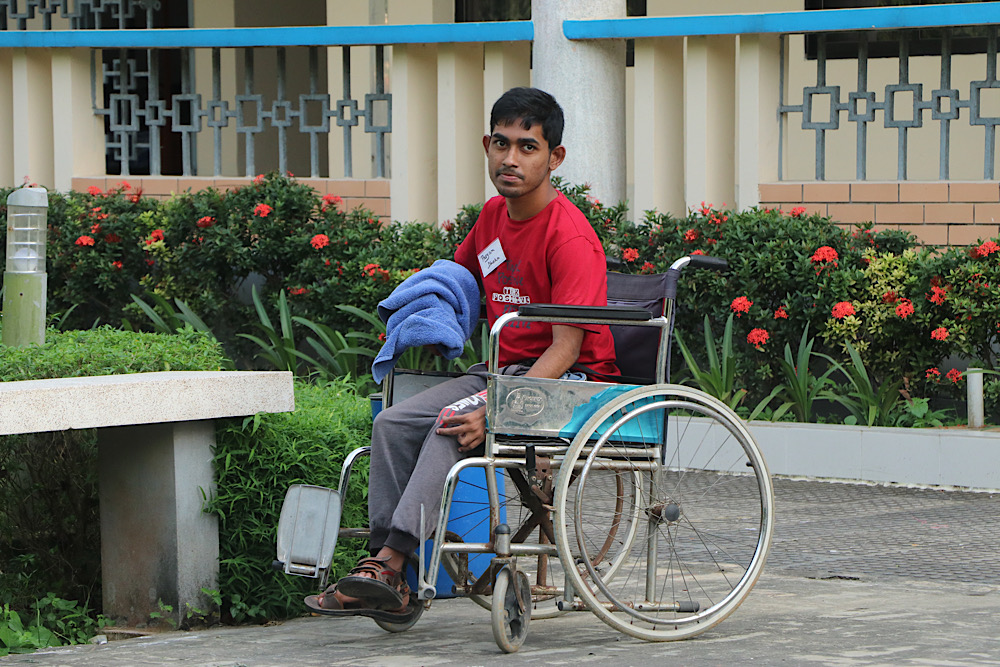Caritas Bangladesh a ‘light’ for thousands of people with disabilities
The story of 14-year-old Mahinur, who thanks to the Catholic organisation's Sddb programme was able to embark on a path to schooling. Coming from a poor family, she faced marginalisation and indifference for a long time; now she dreams of becoming a teacher. Like her, 6,378 people in eight districts receive support.
Gazipur (AsiaNews) - ‘Caritas has shown me the path to the light. And I believe that one day I will be able to count on my own strength and alleviate the suffering of my parents’.
Mahinur, 14 years old, is a disabled girl full of talents, who tells AsiaNews that she dreams of one day becoming a teacher. Born into a very poor family of nine in the Barishal district of south-central Bangladesh, with her father Ali Akbar a day labourer and her mother Golapi Begum a housewife, she has to share meagre resources with six other siblings.
Against a background of severe difficulties, the young woman found help in the Caritas Bangladesh project entitled ‘Promotion of Inclusive Communities for Senior Citizens, Persons with Disabilities and Drug Users/Abusers in Bangladesh (Sddb)’, which she got to know after a visit by volunteers.
As part of the initiative, Mahinur became a member of the Probin Protibondi Hitoishi Club, which she attends regularly and actively, visiting the homes of other comrades and gathering information and news about their problems, with a collaborative spirit that has earned her the role of secretary.
Mahinur regularly attends class VIII. In the early days of school, her classmates showed an attitude of indifference, if not hostility in some cases, but her joining the club and the contribution of the Caritas project have enabled her to strengthen her level of education, thanks also to scholarships and incentives.
This support has increased her interest in books while her teachers express satisfaction with the enthusiasm and interest shown by the girl, providing her with additional motivation. Reflecting on her journey with Caritas, the young woman said: ‘The project has given me educational support and motivation, and I am sure it will continue to serve people and make a difference day after day.
Today, her family is also ready to encourage and support her, dreaming of a better future for her. Today, she frequently participates in the training courses and seminars of the Sddb project, learning and challenging herself. Her acceptance in rural society is gradually increasing and she is becoming more confident as her knowledge and skills increase. Like Mahinur, Caritas Bangladesh finds solutions for people with disabilities through various projects, and thousands of people have benefited and still benefit from them.
According to the National Survey of Persons with Disabilities (Nspd) 2022 by the Bangladesh Bureau of Statistics (Bbs), the country has nearly 4.3 million persons with disabilities, with a majority of physical impairments.
These are people who face significant delays and obstacles in accessing health, education and employment. Only 40 per cent of disabled people attend school, and only 27 per cent are engaged in economic or employment activities. However, with the necessary support, people with disabilities could become an asset to the nation.
A three-day national meeting dedicated to persons with disabilities, promoted within the framework of the Sddb project of Caritas Bangladesh, has just ended at the Holy Cross Pastoral and Retreat Centre in Bhadun, near Dhaka.
The meeting was attended by over 200 persons with disabilities from 24 different areas of the country. Daud Jibon Das, programme director of Caritas Bangladesh, emphasises that the Christian organisation ‘has been working for over 50 years to improve the lives of marginalised people’.
Through the Caritas Sddb project spread over eight regions, up to 6,378 people have benefited from the aid and improved their lives. Shahadat Hossain, social worker in the Gazipur upazila, adds that ‘in the past, families often hid people with disabilities out of shame. Thanks to various governmental and non-governmental efforts, people with disabilities are now openly claiming their rights'.







.png)










